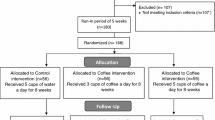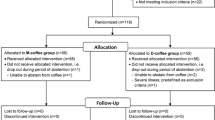Abstract
Purpose
To determine the DNA protective effects of a standard coffee beverage in comparison to water consumption.
Methods
The single-blind, randomised controlled study with parallel design included healthy women (n = 50) and men (n = 50) recruited from the general Central European population. The subjects were randomised in a coffee and a control group, with stratification for sex and body mass index. The study comprised two periods of 4 weeks: a preconditioning period, with daily consumption of at least 500 ml water but no coffee, nor tea, nor any other caffeine-containing product. During the subsequent intervention period the coffee group consumed 500 ml of freshly brewed dark roast coffee blend per day, the control group consumed water instead. On the last day of each period, blood was drawn and analysed by comet assay (single-cell gel electrophoresis) to assess the level of DNA damage (strand breakage).
Results
At the end of the intervention period the mean level of DNA strand breaks in the coffee group has decreased in comparison to the control group [difference in means 0.23% TI (tail intensity), p = 0.028]. The mean change from baseline (delta value) was − 23% in the coffee group (p = 0.0012). Effects of coffee intake were similar for men and women. During intervention, neither group showed any significant change in body weight or calorie intake.
Conclusions
Our results indicate that regular consumption of a dark roast coffee blend has a beneficial protective effect on human DNA integrity in both, men and women.



Similar content being viewed by others
Abbreviations
- BMI:
-
Body mass index
- CQA:
-
Caffeoylquinic acid
- ITT:
-
Intention to treat
- NMP:
-
N-Methylpyridinium
- PP:
-
Per protocol
- SD:
-
Standard deviation
- TI:
-
Tail intensity
- WRST:
-
Wilcoxon rank sum test
- WSRT:
-
Wilcoxon signed rank test
References
Hamer M, Witte DR, Mosdøl A, Marmot MG, Brunner EJ (2008) Prospective study of coffee and tea consumption in relation to risk of type 2 diabetes mellitus among men and women: the Whitehall II study. Br J Nutr 100(5):1046–1053. https://doi.org/10.1017/S0007114508944135
Zhang W, Lopez-Garcia E, Hu FB, van Dam RM (2009) Coffee consumption and risk of cardiovascular diseases and all-cause mortality among men with type 2 diabetes. Diabetes Care 32(6):1043–1045. https://doi.org/10.2337/dc08-2251
Bidel S, Tuomilehto J (2012) The emerging health benefits of coffee with an emphasis on type 2 diabetes and cardiovascular disease. Eur Endocrinol 9(2):99–106. https://doi.org/10.1002/9781119949893.ch9
Malerba S, Turati F, Galeone C, Pelucchi C, Verga F, La Vecchia C, Tavani A (2013) A meta-analysis of prospective studies of coffee consumption and mortality for all causes, cancers and cardiovascular diseases. Eur J Epidemiol. https://doi.org/10.1007/s10654-013-9834-7
von Ruesten A, Feller S, Bergmann M, Boeing H (2013) Diet and risk of chronic diseases: results from the first 8 years of follow-up in the EPIC-Potsdam study. Eur J Clin Nutr 67(4):412–419. https://doi.org/10.1038/ejcn.2013.7
Ding M, Satija A, Bhupathiraju SN, Hu Y, Sun Q, Han J, Lopez-Garcia E, Willett W, van Dam RM, Hu FB (2015) Association of coffee consumption with total and cause-specific mortality in 3 large prospective cohorts. Circulation 132(24):2305–2315. https://doi.org/10.1161/circulationaha.115.017341
Bakuradze T, Lang R, Hofmann T, Stiebitz H, Bytof G, Lantz I, Baum M, Eisenbrand G, Janzowski C (2010) Antioxidant effectiveness of coffee extracts and selected constituents in cell-free systems and human colon cell lines. Mol Nutr Food Res 54(12):1734–1743. https://doi.org/10.1002/mnfr.201000147
Bichler A, Cavin C, Simic T, Chakraborty A, Ferk F, Hoelzl C, Schulte-Hermann R, Kundi M, Haidinger G, Angelis K, Knasmüller S (2007) Coffee consumption protects human lymphocytes against oxidative and 3-amino-1-methyl-5H-pyrido[4,3-b]indole acetate (Trp-P-2) induced DNA-damage: results of an experimental study with human volunteers. Food Chem Toxicol 45(8):1428–1436. https://doi.org/10.1016/j.fct.2007.02.001
Esposito F, Morisco F, Verde V, Ritieni A, Alezio A, Caporaso N, Fogliano V (2003) Moderate coffee consumption increases plasma glutathione but not homocysteine in healthy subjects. Aliment Pharmacol Ther 17(4):595–601. https://doi.org/10.1046/j.1365-2036.2003.01429.x
Hoelzl C, Knasmüller S, Wagner K-H, Elbling L, Huber W, Kager N, Ferk F, Ehrlich V, Nersesyan A, Neubauer O, Desmarchelier A, Marin-Kuan M, Delatour T, Verguet C, Bezençon C, Besson A, Grathwohl D, Simic T, Kundi M, Schilter B, Cavin C (2010) Instant coffee with high chlorogenic acid levels protects humans against oxidative damage of macromolecules. Mol Nutr Food Res 54(12):1722–1733. https://doi.org/10.1002/mnfr.201000048
Boettler U, Sommerfeld K, Volz N, Pahlke G, Teller N, Somoza V, Lang R, Hofmann T, Marko D (2011) Coffee constituents as modulators of Nrf2 nuclear translocation and ARE (EpRE)-dependent gene expression. J Nutr Biochem 22(5):426–440. https://doi.org/10.1016/j.jnutbio.2010.03.011
Bakuradze T, Boehm N, Janzowski C, Lang R, Hofmann T, Stockis J-P, Albert FW, Stiebitz H, Bytof G, Lantz I, Baum M, Eisenbrand G (2011) Antioxidant-rich coffee reduces DNA damage, elevates glutathione status and contributes to weight control: results from an intervention study. Mol Nutr Food Res 55(5):793–797. https://doi.org/10.1002/mnfr.201100093
Bakuradze T, Parra GAM, Riedel A, Somoza V, Lang R, Dieminger N, Hofmann T, Winkler S, Hassmann U, Marko D, Schipp D, Raedle J, Bytof G, Lantz I, Stiebitz H, Richling E (2014) Four-week coffee consumption affects energy intake, satiety regulation, body fat, and protects DNA integrity. Food Res Int 63(Part C):420–427. https://doi.org/10.1016/j.foodres.2014.05.032
Bakuradze T, Lang R, Hofmann T, Eisenbrand G, Schipp D, Galan J, Richling E (2015) Consumption of a dark roast coffee decreases the level of spontaneous DNA strand breaks: a randomized controlled trial. Eur J Nutr 54:149–156. https://doi.org/10.1007/s00394-014-0696-x
Lang R, Wahl A, Stark T, Hofmann T (2011) Urinary N-methylpyridinium and trigonelline as candidate dietary biomarkers of coffee consumption. Mol Nutr Food Res 55(11):1613–1623. https://doi.org/10.1002/mnfr.201000656
Akor-Dewu MB, El Yamani N, Bilyk O, Holtung L, Tjelle TE, Blomhoff R, Collins AR (2014) Leucocytes isolated from simply frozen whole blood can be used in human biomonitoring for DNA damage measurement with the comet assay. Cell Biochem Funct 32(3):299–302. https://doi.org/10.1002/cbf.3016
Collins AR, Oscoz AA, Brunborg G, Gaivão I, Giovannelli L, Kruszewski M, Smith CC, Štětina R (2008) The comet assay: topical issues. Mutagenesis 23(3):143–151. https://doi.org/10.1093/mutage/gem051
EFSA Panel on Dietetic Products Nutrition and Allergies (2015) Scientific opinion on the safety of caffeine. EFSA J 13(5):4102. https://doi.org/10.2903/j.efsa.2015.4102
Valverde M, Rojas E (2009) Environmental and occupational biomonitoring using the Comet assay. Mutat Res Rev Mutat Res 681(1):93–109. https://doi.org/10.1016/j.mrrev.2008.11.001
Lu Y, Morimoto K, Nakayama K (2006) Health practices and leukocyte DNA damage in Japanese hard-metal workers. Prev Med 43(2):140–144. https://doi.org/10.1016/j.ypmed.2006.03.008
Poole R, Kennedy OJ, Roderick P, Fallowfield JA, Hayes PC, Parkes J (2017) Coffee consumption and health: umbrella review of meta-analyses of multiple health outcomes. BMJ 359:j5024. https://doi.org/10.1136/bmj.j5024
Misík M, Hoelzl C, Wagner K-H, Cavin C, Moser B, Kundi M, Simic T, Elbling L, Kager N, Ferk F, Ehrlich V, Nersesyan A, Dusinská M, Schilter B, Knasmüller S (2010) Impact of paper filtered coffee on oxidative DNA-damage: results of a clinical trial. Mutat Res Fundam Mol Mech Mutagen 692:42–48. https://doi.org/10.1016/j.mrfmmm.2010.08.003
Martini D, Del Bo C, Tassotti M, Riso P, Del Rio D, Brighenti F, Porrini M (2016) Coffee consumption and oxidative stress: a review of human intervention studies. Molecules 21(8):979. https://doi.org/10.3390/molecules21080979
Paur I, Balstad TR, Blomhoff R (2010) Degree of roasting is the main determinant of the effect of coffee on NF-kB and EpRE. J Free Radic Biol Med 48(9):1218–1227. https://doi.org/10.1016/j.freeradbiomed.2010.02.005
Shaposhnikov S, Hatzold T, Yamani NE, Stavro PM, Lorenzo Y, Dusinska M, Reus A, Pasman W, Collins A (2018) Coffee and oxidative stress: a human intervention study. Eur J Nutr 57(2):533–544. https://doi.org/10.1007/s00394-016-1336-4
Acknowledgements
We thank Thomas Hofmann and Roman Lang (Technical University of Munich) for NMP, trigonelline and creatinine measurements (compliance), and Lubica Prochazkova, Helena Nagyova, Edita Mrvikova and Zuzana Krchnava from Slovak Medical University for technical help.
Funding
This study has been supported by Tchibo GmbH, Hamburg, Germany.
Author information
Authors and Affiliations
Corresponding author
Ethics declarations
Conflict of interest
D. Schipp is a self-employed statistician, who has been appointed and financed by Tchibo GmbH for this and other projects.
Ethical standards
The study has been performed in accordance with the ethical standards laid down in the 1964 Declaration of Helsinki and its later amendments.
Rights and permissions
About this article
Cite this article
Schipp, D., Tulinska, J., Sustrova, M. et al. Consumption of a dark roast coffee blend reduces DNA damage in humans: results from a 4-week randomised controlled study. Eur J Nutr 58, 3199–3206 (2019). https://doi.org/10.1007/s00394-018-1863-2
Received:
Accepted:
Published:
Issue Date:
DOI: https://doi.org/10.1007/s00394-018-1863-2




